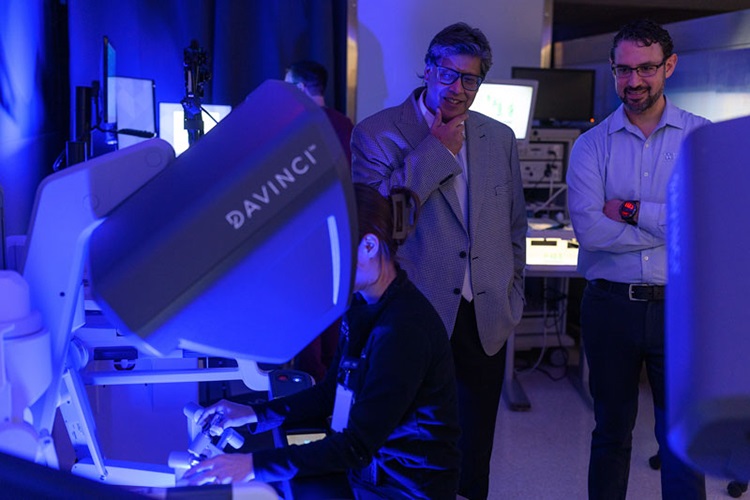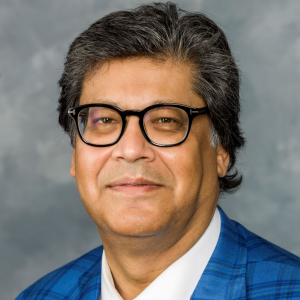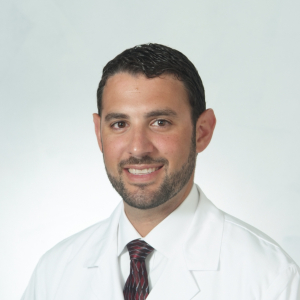As a resident, Zaki Hassan, MBBS, handwrote the grant application for the $250,000 that went to purchase the University of Kentucky's first human patient simulator.
In the 30 years since, Dr. Hassan has been a driving force in the growth and improvement of simulation as a means to train medical students, residents, and fellows. He has served 15 years as director of the Simulation Center. After being named chair of anesthesiology in 2022, Dr. Hassan realized he couldn't do both jobs-- at least not to his own exacting standards. So in December, he stepped down as the center's director.
Jonathan Bronner, MD, the new medical director of the center, has long been involved with the facility and has led simulation training in emergency medicine and with the College of Medicine for many years.
Dr. Hassan will never be too far away from the center he helped establish. A commemorative plaque was recently unveiled to acknowledge and honor him for his “dedication and leadership in establishing a world-class hub for medical training and innovation.”
But he feels confident leaving his successor in charge. “Dr. Bronner is doing a fantastic job,” said Dr. Hassan. “He really is a natural successor to lead the Simulation Center.”
In 2018, UK HealthCare opened the spacious new state-of-the-art educational space on the second floor of Chandler Hospital. It houses the technology needed for multidisciplinary training and research to advance patient safety and to educate students and health care providers – even those around the world.
“The software room is full of equipment that allows us to interact with simulation, both nationally and internationally,” said Dr. Hassan.
The hope and intention of these international relationships are that schools and health care facilities abroad would start their own simulation centers or, if they don't have that option, be able to use UK's center for training.
While the day-to-day operations of the center will now be Dr. Bronner’s responsibility, Dr. Hassan will never lose what he calls his “passion and love for and an avid interest in the Simulation Center.”
Already quite interested in simulation when he arrived at UK in 1996 to complete his residency, Dr. Hassan started the simulation training program with a single mannequin.
“At that time, simulation was pretty embryonic and mainly involved training for doing CPR and that kind of thing,” he said. “But we had a bigger vision- to incorporate simulation in crisis resource management, quality assurance, and improvement and to use complex, high-tech scenarios to train people in patient care procedures without compromising patients’ health or safety.”
Dr. Bronner has been involved with the Simulation Center since it opened in its current location, starting with his own department in emergency medicine and creating a simulation education program for UK residents, students, and providers. About a year ago Dr. Hassan asked him to join him in directing the center.
“I really want to emphasize Dr. Hassan's role because he's been a champion for simulation for several decades now,” said Dr. Bronner. “He welcomed my emergency medicine group years ago, along with several others, to come in and utilize it, to build programs.”
Thousands of UK medical students, residents, and fellows have been trained in the center over the years, gaining valuable hands-on experience with high-fidelity manikins and mastering various procedures they will soon be performing on real patients.
“If you're looking for an engaging place to train or to teach, I think we're probably the best place in the hospital,” said Dr. Bronner. “Our adult learners in medical school, residency, and fellowship programs, learn differently. They want more engagement with clinical learning rather than the way it used to be, with learners sitting in traditional lectures and taking notes.”
UK HealthCare providers of all kinds get trained in the center as well. One of the big initiatives this year, for example, is to provide Advanced Cardiovascular Life Support (ACLS) training for clinical providers working in the hospital.
Another goal is to provide essential procedural credentialing services for UK HealthCare so physicians and advanced practice providers can take even better care of patients while maintaining the highest safety standards.
Just as Dr. Hassan has guided the Simulation Center through its past, he looks to its future.
“Our next phase in growth is looking at AI and holographic and 3D simulation, as well,” he said. “These are the next stages for growth of simulation and in the simulation industry.”
Staying close by to witness the advancements that he knows will come, Dr. Hassan plans to continue supporting the center whenever and however he can.
“I’m always available,” he said. “I’m just around the corner if anybody needs me.”


